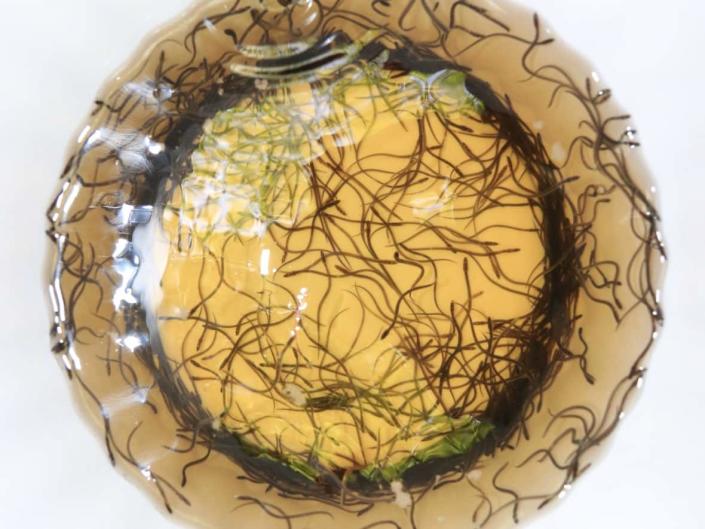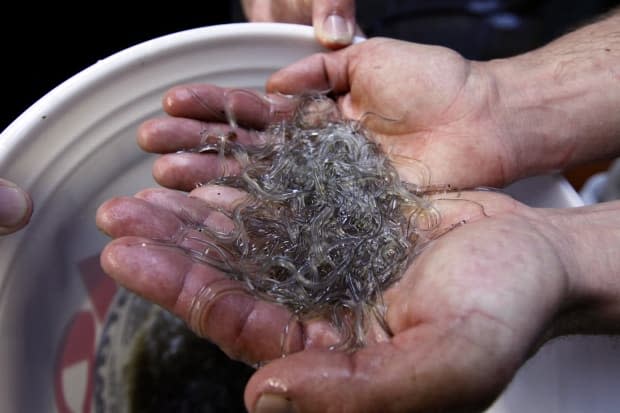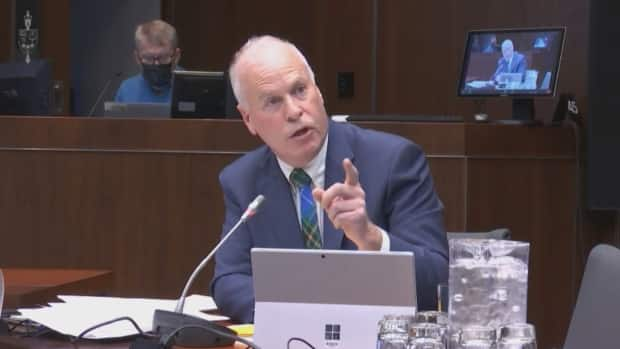Mon, April 3, 2023

A bucket of elvers is shown near Chester, N.S., in 2019. (Richard Cuthbertson/CBC - image credit)
For a second year, the federal government is giving Mi'kmaw First Nations 14 per cent of the lucrative Maritime fishery for baby eels — or elvers — without compensating commercial licence holders.
The transfer implements the Mi'kmaw treaty right to fish for a moderate living, but also sets the stage for further court challenges by commercial elver licence holders.
"I'm quite confident that we will be taking legal action based on this again," said Michel Samson, a lawyer representing Wine Harbour Fisheries.
Wine Harbour is one of several licence holders in federal court trying to overturn the 2022 decision, saying it was unfair and rushed.
The quota transfer will collectively cost seven commercial licence holders several million dollars, based on 2022 prices which reached $5,000 per kilogram.
The tiny, translucent elvers are caught in Maritime rivers, shipped live to Asia and grown for food.
Fisheries and Oceans Canada (DFO) has put licence holders on notice that a permanent cut is coming.
"Over the course of 2023, and consistent with the Government of Canada's reconciliation agenda to increase First Nation participation in fisheries, DFO will conduct a review of the elver fishery with a primary objective being the sharing of benefits through enhanced Indigenous participation in the fishery over the longer term," Jennifer Ford, DFO's director of resource management and licensing, Maritimes region, wrote in a March 28 letter to industry.
Ford outlined this year's allocation: 1,200 kilograms — or 14 percent of the commercial quota — to 10 Mi'kmaw communities.

Robert F. Bukaty/Associated Press
The quota cut does not affect the We'koqma'q First Nation in Cape Breton, which also holds a commercial licence.
In 2022, DFO also took 1,200 kilos of commercial quota but only allocated 600 kilograms to the Mi'kmaq. The remaining 600 kilograms were not caught.
In 2023, the full 1,200 kilograms has been allocated based on DFO authorizations that reflect community harvest plans.
Commercial licence holders object
In southern Nova Scotia, Kespukwitk First Nations (Acadia, Annapolis Valley, Bear River and Glooscap First Nations) will designate harvesters from among their members to fish a 450-kilogram allocation, an increase of 50 kilograms compared to 2022.
The Wolastoqey Nations in New Brunswick (Madawaska Maliseet, Tobique, Woodstock, Kingsclear, St. Mary's and Oromocto First Nations) will also designate harvesters from among their members to fish a 750-kilogram allocation, an increase of 550 kilograms compared to 2022.
The Assembly of Nova Scotia Mi'kmaw Chiefs did not provide comment.
Commercial licence holders say they have been poorly treated.
They claim in 2022 DFO did not consider their offers to sell out in good faith — a process known as willing-buyer, willing-seller.
It has been used for decades to integrate Mi'kmaq into commercial fisheries without increasing pressure on a given species.
'It's a smash and grab'
Samson says this year was worse.
"This is now two years in a row that the minister is arbitrarily cut quota without offering compensation. And without even asking for proposals from license holders who would be prepared to exit the fishery. And that should send a chilling effect across all commercial fisheries in Canada," he said.
"It's a smash and grab, you know, basically put a gun to your head and they're just going to take it," says Brian Giroux, a member of the board of directors for the Shelburne Elver Group. "They never even gave the willing buyer, willing seller process a chance."
Mi'kmaw entry to elver fishery challenged by N.S. MP
Justice Department lawyers told the federal court earlier this year DFO is not obliged to compensate licence holders even if federal fisheries ministers have repeatedly committed to the process.
In Ottawa, Nova Scotia Conservative MP Rick Perkins has regularly challenged Fisheries Minister Joyce Murray about the elver fishery.
"Eleven per cent of the licenses have now gone, are made-up of First Nations, while the Mi'kmaq are only 2.7 per cent of the population. So what's the level at which you say, OK, that's enough licenses relative to the overall total allowable catch?" Perkins asked Murray at a parliamentary committee meeting last week.

CBC
"Our reconciliation fisheries are not specifically about population quota. They are about our mandate to implement the UN Declaration on the Rights of Indigenous Peoples and accommodate a treaty affirmed rights to fish," Murray said.
Murray has repeatedly said DFO remains committed to the willing-buyer, willing-seller process because it provides predictability in the market but will not allow failure to reach a deal to thwart expanding Indigenous access.
No comments:
Post a Comment